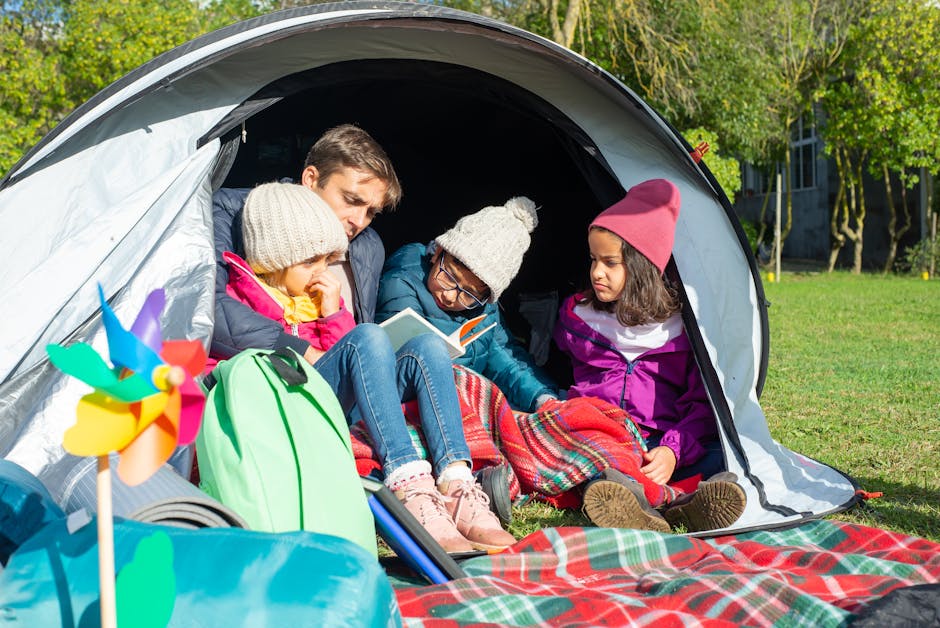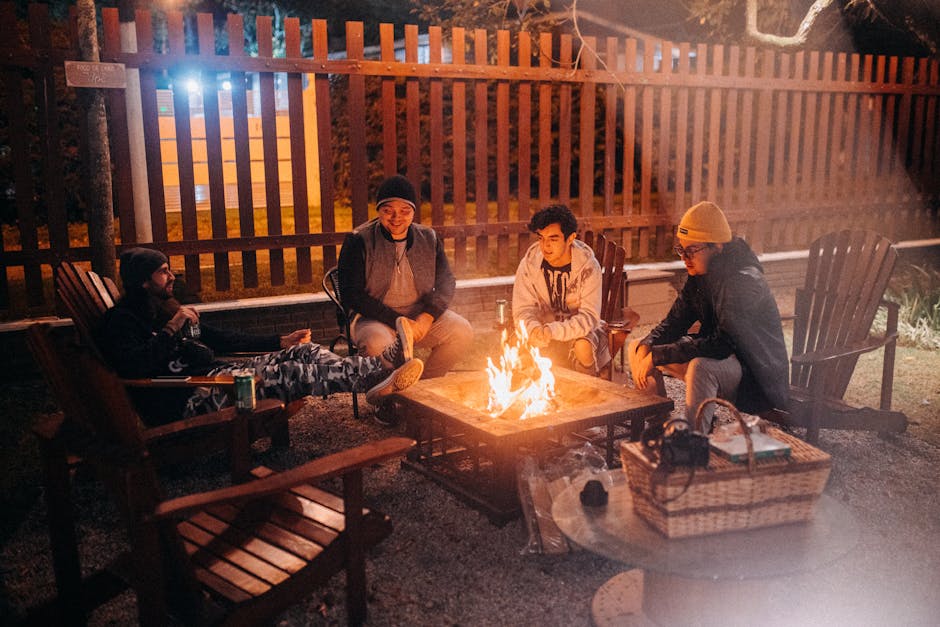Choosing the Right RV
Choosing the Perfect RV for Full-time Living with Kids
Embarking on a full-time RV lifestyle with kids requires selecting an RV that provides comfort, functionality, and space for every family member. Here's how to make the right choice:
- Prioritize Sleeping Quarters – Look for an RV with multiple sleeping areas. Kids value their own space. Models with bunk beds or toy haulers with transformable bedroom spaces are great options. Each child having a consistent and private sleeping area can significantly impact the overall harmony on board.
- Consider School and Play Spaces – If you're homeschooling or roadschooling, think about where your kids will do their learning. An RV with a dinette or small desk can double as a school area. Also important is play space — ensure there's enough room for toys and activities inside for those rainy days.
- Kitchen and Bathroom Facilities Matter – With kids, you'll likely cook more often. An RV with a full-size fridge, ample pantry storage, and sufficient kitchen space makes meal prep easier. Similarly, consider an RV with at least one full bathroom. For larger families, models with an additional half bath might be worth exploring.
- Prioritize Storage — Kids come with a lot of stuff! From clothes and school supplies to toys and outdoor gear, having enough storage is key to staying organized. Look for RVs with under-bed storage, overhead cabinets, and ample exterior compartments.
- Don't Skimp on Outdoor Living Space – RVs that enhance outdoor living are ideal. Awnings for shaded seating, exterior storage for bikes and toys, and even an outdoor kitchen can extend your living space into the great outdoors where your kids will spend much of their time exploring.
- Consider Weights and Towing – It's easy to get carried away with size and features, but remember to consider the weight of the RV fully loaded and if your vehicle can tow it or if a new tow vehicle is needed. This ensures safe travels and prevents unnecessary budget strains.
- Try Before You Buy – If possible, rent an RV similar to the type you're considering. Spend a week living in it with your kids to test drive the lifestyle. This experience can offer valuable insights into what features you really need.
Choosing the perfect RV for full-time living with kids requires focusing on what truly matters to your family. Finding the one that hits most of your checkboxes can launch your family into a memorable adventure. Remember, it's less about the perfect RV and more about the mindset to adapt, enjoy, and thrive wherever your home-on-wheels takes you.

Homeschooling on the Road
Homeschooling on the Road: A Guide to Getting Started
Homeschooling while embracing the full-time RV lifestyle offers a unique blend of education, travel, and family bonding. This journey requires careful preparation and planning to ensure a smooth transition. Here's a guide to getting started with homeschooling on the road.
Establishing a Routine
Creating a routine is one of the first steps in successful RV homeschooling. While the open road brings unpredictability, a consistent daily schedule provides stability for kids. Determine designated times for subjects, meals, and breaks just like a traditional school day. Having a flow that everyone anticipates daily is key.
Choosing the Right Curriculum
Select a curriculum that fits your travel lifestyle. Flexible, and possibly online, educational resources that can adjust to varying internet availability on the road are ideal. Engage in programs that complement your travels, such as history lessons about locations you're visiting. Mix and match curricula to suit each child's learning style and interests.
Legal Considerations
Each state has its own homeschooling laws and requirements. Determine your state of domicile – a legal residence for tax, voting, and schooling purposes – and ensure adherence to its homeschooling laws. This may involve keeping records, standardized testing, or giving notice of your homeschooling status.
Learning Outside the Box
The RV lifestyle provides opportunities for unconventional learning. Museums, historical sites, and nature trails offer hands-on educational experiences. Involve kids in trip planning as a geography lesson or in cooking as a practical math session. Use your surroundings to inspire lessons, making learning interactive and engaging.
Creating a Mobile Classroom
Space optimization in an RV is essential. Designate an area where kids can study without distractions. It doesn't need to be big – a nook with a table or a transformable space serves well. Ensure this area is well-equipped with school supplies and organized to promote productive learning.
Digital Tools and Connectivity
Embracing technology expands educational opportunities. Tablets, e-readers, and laptops occupy less physical space while providing access to countless resources. Investing in a reliable internet solution, like a mobile hotspot, allows for downloadable content and streaming educational videos, ensuring continuous learning.
Incorporating Socialization
Cultivating social skills while on the move involves creativity. Connect with other traveling families through networks or online communities for meet-ups and joint field trips. Many locations offer classes or workshops that cater to children, offering both learning and social interaction.
Navigating the homeschooling path while living the RV lifestyle requires preparation, flexibility, and a willingness to learn. With the right approach, you can provide your kids with a valuable education enriched by the experiences the world has to offer.

Maintaining Social Connections
Embracing RV Life with Kids: Maintaining Social Connections on the Road
Embracing RV life with your kids is an exciting journey that redefines the notions of home and education. As families dive into this nomadic lifestyle, ensuring kids maintain social connections is important. Let's explore how to embrace the RV life while fostering your kids' social development.
Join RVing Communities
Immerse yourself in RVing communities. There's an active community of fellow RV families out there. Joining groups like Fulltime Families or Xscapers can plug you into a network where social gatherings, educational co-ops, and shared travel plans are common. These communities often organize meet-ups, adventures, and group learning opportunities that allow kids to forge friendships with peers who share a similar lifestyle.
Participate in Virtual Clubs and Groups
Technology ensures distance no longer dictates the bounds of socialization. Enroll your kids in virtual clubs that align with their interests—be it coding, art, science, or literature. Platforms such as Outschool offer classes and clubs where kids can interact with peers under guided supervision, allowing social connections to flourish despite geographic variances.
Leverage Campgrounds for Social Opportunities
Campgrounds can be more than just a place to park your RV—they're potential hotspots for kids' socialization. Encourage your children to join campground activities designed for young campers. Craft sessions, nature hikes, or sports outings at the campground can serve as prime moments for kids to meet and befriend others on the road.
Commit to Regular Check-ins with Home
Staying in touch with friends and relatives back 'home' is crucial. Schedule regular video calls and virtual hangouts with school friends, cousins, or neighborhood chums. These digital lifelines can help maintain pre-existing friendships, grounding your kids in a sense of belonging and continuity.
Cultivate a Habit of Exploration
Every new location presents an opportunity for social exploration. Visiting local libraries, attending community events, or signing up for day classes aligned with your kids' interests—diving into the local culture can be both educational and a means to meet others outside the immediate RV circle. Encourage your kids to be open to forming friendships along the way.
Emphasize the Value of Communication
Nurture your kids' communication skills. Whether it's letter writing to friends afar or teaching them the etiquettes of online communication—being articulate about their thoughts and feelings will serve them well in maintaining lasting friendships regardless of their physical whereabouts.
Ensuring your kids maintain social connections while embracing RV life involves being proactive and creative. Affiliate with communities that share your lifestyle, use technology for virtual engagements, make the most out of campground networks, stay connected to roots back home, explore local opportunities, and foster strong communication skills. This way, your RV journey can be rich with learning and filled with meaningful friendships for your children.

- Fulltime Families. Full-Time RV Memberships for Roadschoolers. Accessed May 27, 2023.
- Xscapers. Lifestyle Group for Working RVers. Accessed May 27, 2023.
- Outschool. Online Classes for Kids. Accessed May 27, 2023.
Leave a Reply